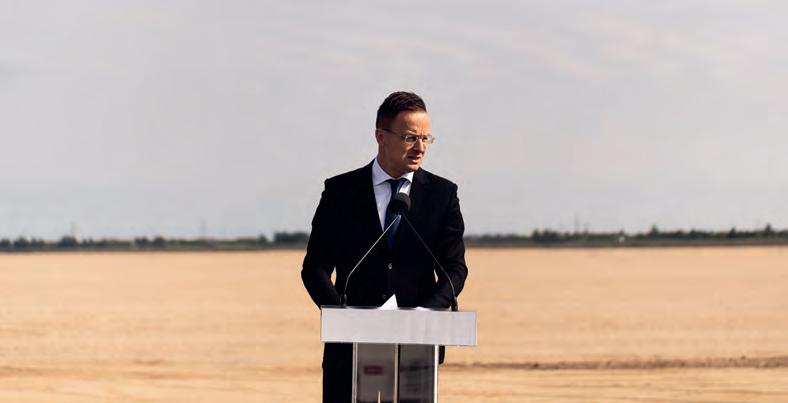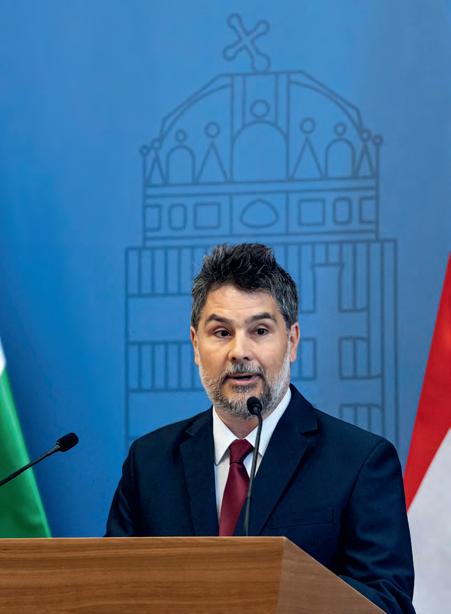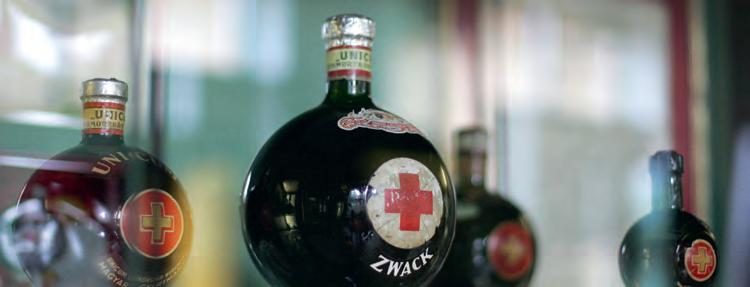
11 minute read
07 COMPANY BRIEFS
company briefs
BUDAPEST AIRPORT: 240 MILLION PASSENGERS IN 70 YEARS
Advertisement
The international airport of Budapest, Ferenc Liszt International Airport, the aerial gateway to Hungary was inaugurated 70 years ago, on May 7, 1950. Over the past seven decades, hundreds of millions of passengers and millions of aircraft have used the runways and the terminal buildings of the airport. Seven decades, more than 240 million passengers, approximately three and a half million landings and takeoffs, two million tons of goods – this is the history, in a nutshell, of the international airport of Budapest. Before the coronavirus pandemic, airport staff handled 40-44,000 passengers and 336 flights on average per day. At the end of 2019, aircraft connected Budapest with 153 foreign destinations, according to a summary by Budapest Airport. The Ferenc Liszt International Airport lies between Budapest Districts XVII and XVIII and the town of Vecsés, on 1,515 hectares, approximately 15 times the area of Margaret’s Island in Budapest. There are more than 200 buildings in this huge expanse, with numerous warehouses, office buildings, the airport’s own power plant, police and firefighter unit, terminal and logistics buildings. In 1950, the year of its opening, the airport handled nearly 50,000 passengers. In 2019, traffic reached a new record, with 16.2 million passengers, which means that passenger traffic increased 325-fold in 70 years. The 21,000 square meters of terminal capacity that existed at the time of opening has grown to more than 103,000 square meters by 2020. According to estimates, the airport handled approximately 430 million pieces of (hold and hand) baggage over the past 70 years. In terms of air cargo, Ferenc Liszt International Airport handled about two million tons of goods over seven decades. 3,000 tons of cargo arrived in and departed from Budapest on average during the first decades of the airport’s history. By 2020, Budapest Airport’s air cargo handling capacity has reached 250,000 tons annually. Over the past five years, cargo traffic at the airport increased by 60% to approximately 150,000 tons per year.

LEGO GROUP TO HELP PANDEMIA AFFECTED FAMILIES IN HUNGARY
90% of students are unable to attend school worldwide and millions of families face financial, work or health difficulties. The global consequences of the coronavirus epidemic have an unprecedented impact on children’s well-being and education. A press release by the LEGO Group has been inspired by the work of thousands of great charities, non-profit and non-governmental organizations (NGOs) working to provide families with basic services during these trying times, whether it is to provide access to education or to support the youngest members of their community to feel valuable and safe.

YARIS KABIN TO ESTABLISH FACTORY IN HUNGARY
Turkish firm Yaris Kabin is establishing its first production unit abroad in Hungary. With this investment worth EUR 20.3 million, announced in the Hungarian capital this May, the company will manufacture tractor and agricultural machinery cabins in Iváncsa, south of Budapest. According to the Hungarian Investment Promotion Agency (HIPA), 150 jobs will be created in four manufacturing halls and an office building to be built on 30,000 square meters of land. Production is expected to start as early as at the beginning of 2021. Founded in 1977 and still owned by the Yaris family, the headquarters and center of the company is in Balikesir, Turkey. Yaris Kabin mainly manufactures cabins for loaders, tractors, excavators, and sprayers. Apart from this, it manufactures tools and performs metal sheet and profile processing, welding, painting, assembly and research and development activities. Its cabin production capacity in Turkey is currently 70,000 pieces per year, representing a market share of 70% in Turkey, and exporting to countries on four continents, too. Yaris Kabin's references include TürkTraktor, Hidromek, Basak, Hitachi and Hattat, but the company is also an official supplier to Fiat .
The LEGO Group and the LEGO Foundation are working together to support children affected by the coronavirus with a total of USD 50 million worldwide. Part of the amount will be offered to existing and new partners in their local communities to help them support the basic care of the children concerned and to give them the opportunity to learn through play, thereby supporting their well-being and developing their skills. In Hungary, the Amigos program captures rare, joyful moments for young patients in the country's hospitals. The foundation of the same name is run by undergraduate students who help children learn language skills and prepare their lessons during the visits, and in addition to the joint skills development game, they are also surprised with small gifts. As current restrictions prohibit access to hospitals, a donation from the LEGO Group helped create Amigos Online. This way, volunteers can keep in touch with their little protégés online and play, learn and laugh together even in these difficult times. An important part of the project is to provide support in as many places as possible.I In cooperation with the Smile Foundation, the two organizations will broaden and strengthen the achieved impact with qualified therapists.

BMW POSTPONES HUNGARY PLANT CONSTRUCTION
BMW Group announced in the middle of May that it would take official possession of the site of its would-be plant in Debrecen, E Hungary, by the end of the month. The head of the plant, Michele Melchiorre said at the land transfer that “we remain committed to the plans for the new plant in Debrecen. However, the global economic situation due to coronavirus pandemic has also an impact on construction, there will be adjustments to the plant construction schedule. The complex timeline is now under review, we assume the delay will be several months.” The Hungarian Minister of Foreign Affairs and Trade, Péter Szijjártó was of the view that “at such a volume of investment, we need to take it natural that the schedule of the construction might have a few months of change. However, I would like to emphasize that every step will happen according to the contracts, there is no need to change any contractual frame. Today, the site has been handed over to BMW, the plant will be built and Debrecen will become a very important center of the global automotive industry.” The Hungarian government is reported to have already spent HUF 12-13 billion on infrastructural projects at or leading to the designated site of the manufacturing plant.
company briefs
RISING PROFITS AND SALES AT RICHTER GEDEON PLC.

Sales and profits grew well above analysts' expectations in the first quarter of this year for the Hungarian pharmaceutical company Richter Gedeon Plc. The firm achieved a consolidated after tax profit of HUF 29.1 billion, which is 34.6% higher than in the same period of the previous year, and its sales revenue increased by 16.3% to HUF 141.4 billion, the company said on the website of the Budapest Stock Exchange. Highlighting the impact of the pandemic, the report says that the company’s capital-intensive balance sheet, currently unencumbered by any loan portfolio and complemented by a consistently positive cash flow, provides a solid foundation for both the crisis and the expected subsequent economic slowdown. "Although the pharmaceutical sector is commonly better shielded from crisis shockwaves, all economic sectors, including our own, were hit by the global COVID pandemic. I am extremely proud of the resilience of our business operations in the face of the disruption caused by the virus. We managed to stand our ground thanks to our organizational culture of trust and cooperation, our vertically integrated business model, our geographic and therapeutic diversification and a strong balance sheet – all of them core values that continue to define our approach to steering the ship of Richter," Gedeon Richter's Chief Executive Officer, Gábor Orbán said.
ZWACK NET SALES ADVERSELY AFFECTED BY TAX HIKES

Hungarian liquor producer Zwack Unicum Plc. saw slight increase in gross sales and significant decrease in net sales in the 2019-2020 business year.
According to audited data, total gross sales of the company were HUF 26,358 million – practically the same as in the previous business year (+HUF 17 million; +0.1%). Net sales (sales revenues excluding excise tax and public health product tax) were HUF 13,960 million, up 11.3% (by HUF 1.8 billion). The cause of the considerable difference between the gross and net sales was the amendment of the Act on Public Health Product Tax (NETA), effective as of January 1, 2019, according to which, each and every type of alcoholic drinks has been taxed and the tax categories were raised by 20%. The company shifted
C
M
the massive tax hike into its gross prices but – just as it had been predicted – that has radically reduced the Y
volume sold. Acting in consensus with the main shareholders, the management decided to raise credits. By doing so,
CM
the company has generated a sufficient financial position even for the contingency that the COVID epidemic MY
might last for a long period. On-trade sales, which account for a half of the company’s revenues, had CY practically discontinued by the end of March as the majority of gastronomic units suspended operation for an indefinite period after the opening hours had been officially shortened to flatten the curve of new cases of CMY
COVID-19. If those restrictive measures stay in force for several more months, the company might have to K
use those credits. In February 2020, when the COVID pandemic situation was becoming serious, the management
considerably increased the stock of the Unicum finished product. That step was meant to forestall the undesirable situation where the unavailability of raw materials could bring the plant to a halt. By the end of March 2020, a considerable part of that quantity had been produced, which in turn strongly increased the closing inventory of finished products.
PANDEMIC: SURGING RISK COSTS AT OTP BANK

Hungary's OTP Bank Plc. has announced that the summary of its first quarter 2020 results has been prepared on the basis of its non-audited separate and consolidated IFRS financial statements for March 31, 2020 or derived from that. Q1 2020 results were shaped mainly by the surging risk costs due to the assumed negative impact of the coronavirus. Consolidated earnings in the first quarter of this year amounted to HUF 31.8 billion adjusted profit after tax with quarter-on-quarter 2% organic performing loan volume growth; as well as surging risk costs as a result of the pandemic, further declining Stage 3 ratio, stable liquidity and capital position. The document states that as a result of the potential impact of COVID-19 pandemic, the original macroeconomic forecast for both Hungary and countries of foreign OTP Group members became outdated. In order to smooth the negative effects of the pandemic, and create the necessary conditions for restarting economic activities, a series of government, central bank and supervisory measures were introduced. Currently, there is a high degree of uncertainties around the depth and duration of the economic recession caused by the pandemic, as well as the steepness of the expected rebound. Also, at the moment, it is difficult to assess the global impact of the pandemic, and the effectiveness of economic protection measures introduced on national and international levels. Accordingly, the management has withdrawn its 2020 Guidance published on March 6, 2020 and will not make any new forecasts for the rest of the year as long as there is no comprehensive information about the state of the macroeconomic and operational environment.
MAGYAR TELEKOM: SLIGHT GROWTH IN Q1 2020

Total revenues at the Magyar Telekom Group in the first quarter of 2020 amounted to HUF 159.333 billion, which is 0.2% higher compared to the corresponding period in 2019, according to the Group’s latest financial report. The operating profit in the first three months of the year was HUF 12.723, 1.1% more than a year before. The report quoted CEO Tibor Rékasi as saying that he was pleased that “despite the negative impact of the COVID-19 pandemic towards the end of the quarter, thanks to continued focus on executing our commercial and strategic priorities, we delivered broadly stable total revenues and EBITDA year-on-year.” He added that the company’s main focus since the outbreak of the coronavirus has been on the swift implementation of measures to safeguard the health and safety of both employees and customers. “We have introduced strict social distancing across the Group and, at this time, around 80% of our employees are working remotely. While the majority of our points of sale remain open, we have significantly limited traffic within stores. Our call centers and online support services are successfully handling the resulting increased volumes of customer requests. In an effort to support our customers during this challenging period, we are also providing free mobile data and TV content, a range of attractively priced laptops and tablets, free voice usage for the most vulnerable in our society as well as payment restructuring for customers in financial difficulties.” Diplomacy-n-Trade.ai 1 2017. 02. 27. 11:22:30








